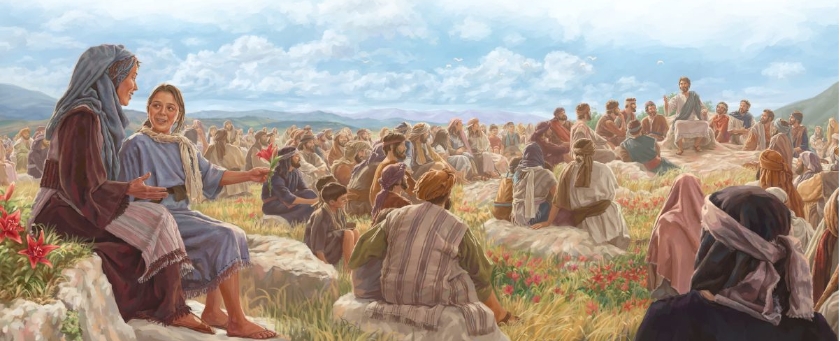Jesus Is The True Giver of the Law
Twelfth Sunday of Ordinary Time, Year A

Readings:
Jer. 20:10-13; Ps. 69; Rm. 5:12-15; Mt. 10:26-33
(Audio recorded live, 25 June 2023)
Fr. Jim’s Last Mass at St. Aloysius
The prophet Jeremiah says, “I hear the whisperings of many: ‘Terror on every side! Denounce! let us denounce him!’” Approximately 40 years before the Babylonian Exile, Jeremiah was called to warn the people that if they do not turn from their evil ways, they will be destroyed. Of course, the people affectionately named him ‘Terror on every side.’ Such is the fate of many of the prophets. They dare to speak God’s word to a people who have become numb to it. In that sense, I suppose things are not much different today. How many people have grown numb to the Word of God? Or how many reject our invitation to return to the Lord? This makes Jeremiah very relatable, not only to our own struggles to bring people to the truth, but also to Jesus. Jesus himself was rejected by the chief priests, the scribes, and the Pharisees, and he was rejected largely by his own people. Is it any wonder that this rejection continues to the present day?
I saw a meme the other day that said, “The obedient always think of themselves as virtuous rather than cowardly.” It is easier to obey, especially if everyone else is doing it, rather than go against the grain. But, what if the people are obedient to a false truth? This is situation Jeremiah was called to address, and the people denounced him for it.
St. Paul provides some insight as to why this may be. He says, “up to the time of the law, sin was in the world, though sin is not accounted when there is no law. But death reigned from Adam to Moses….” So the time between Adam and Moses was ruled by death, as St. Paul says, the wages of sin is death. But, from the time of Moses to Christ, the Law exposed sin. It taught the Israelites to know their limits, not so they could see what they could get away with, but rather, so they could live more fully the freedom they were called to exercise by God. This Law, which we refer to as the 10 Commandments, was amended over time with an additional 603 prescripts that were also to be followed. Later generations then introduced their own man-made laws to these, referred to as the tradition of the Elders. As these laws became more prevalent, the people were also expected to follow them. But, such laws were not written by God, they were written by man.
In the Gospel of Matthew, Jesus is presented as a new Moses, the true interpreter of the Law. He clarifies the ancient Law in his Sermon on the Mount, but warns his disciples that those who follow him will be persecuted. The Sermon even begins with the Beatitudes: “Blessed are you when they insult you and persecute you and utter every kind of evil against you [falsely] because of me” (Matt. 5:11). Is this not the kind of rejection we see of Christians throughout the world today? Yet, Jesus encourages his disciples to persevere, saying, “Fear no one. Nothing is concealed that will not be revealed, nor secret that will not be known.” Whatever evil is done in the darkness will be exposed by the light. But, he warns us all to take care of our souls. That is why our regular celebration of the Sacraments is vital.
Speaking of vitality, this is the last Sunday of my term here at St. Aloyisus, and I cannot express in words how vital my time here has been. One of the greatest gifts a new priest can have is a positive experience in their first assignment, and you have all had a role to play in that. A lot has happened in 5 years. Fr. Bambrick said that I have had more unique experiences in my time here than many priests have in their whole careers. I will never forget the special wedding I celebrated in a parishioner’s bedroom, or the couple I was able to assist with a sanatio, or the handful of convalidation/baptism/confirmation ceremonies. There there were at least a couple dozen weddings, being present for two schools, a few healing miracles through the anointing of the sick, religious ed retreats, and of course, the regular celebration of the sacraments. All of these experiences had to do with the lives of the people God made me a part of. Having strengthened me with all these beautiful experiences, is it any wonder that the bishop would call me to use that experience as an Administrator? So, you have only yourselves to blame for me going. And while parting can sometimes be sad, we are not parting ways, because the way of Christ, which we have all striven to walk together continues in us all. He is the way, and the truth, and the life, wherever we are.
And so, while I will be taking my bass guitars and rocking out in a different town, may we always remember the life we lived together, the good we did together, the prayers we prayed together, the liturgy we celebrated together, as it was all for the greater glory of God. This is not goodbye, but a fond farewell. And remember, if you are ever in Marlton, you have a friend at St. Isaac Jogues.





Share this post
Twitter
Facebook
Pinterest
Email